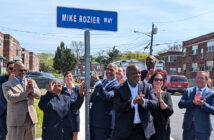Repealing the Medicaid expansion granted by the Affordable Care Act would eliminate health coverage for 10 percent of New Jersey adults, hitting those in service industries and urban centers the hardest.
By Matt Skoufalos | November 28, 2016
Repealing the Affordable Care Act (ACA) could cut health coverage for 10 percent of adults in the state, eliminate nearly $3 billion in federal health subsidies for some of its most vulnerable working residents, and jeopardize around 24,000 jobs in the healthcare sector, according to policy analysis from a Trenton-based thinktank.
A report released Monday by New Jersey Policy Perspective (NJPP) suggests that canceling the ACA nationwide would disproportionately affect New Jersey by eliminating insurance for 528,000 residents who gained health coverage through the 2014 expansion of Medicaid benefits.
The Medicaid expansion that allowed childless adults to apply for health coverage through the ACA helped lower the ranks of New Jersey’s uninsured to 771,000 statewide, a 34-percent drop from 2013 levels, NJPP reports. Combined with insurance subsidies provided under the ACA, the expansion principally benefited low-wage earners whose incomes exceeded the federal poverty threshold but may not exceed $15,800 individually. In New Jersey, most of these people work in restaurants, schools, construction, and home healthcare service industries, according to census data.
Although an ACA repeal would affect an estimated 10 percent of New Jersey residents, those residing in cities would be the hardest hit, according to the NJPP report. Per capita, the hardest-hit would be Camden City, in which an estimated 32 percent of adults could lose health coverage.
Statewide, the financial impact of an ACA repeal would climb from an estimated $2.9 billion in 2018 to $11.2 billion by 2021, NJPP estimates, not only on the back of reduced federal subsidies, but from increased local costs. In New Jersey, the ACA created about $470 million in savings that will necessitate either revenue replacements or service cuts if it is repealed. Prior to that, state funds covered 35 percent of the healthcare costs of 167,000 residents in order to get a 65-percent federal match for NJ FamilyCare insurance (which the report notes has since expired).
Further, health coverage often keeps patients from using the hospital as their first point of contact, which lowers overall insurance costs for every insured person. Combined with New Jersey charity care laws and decreased funding levels to support them, “state policymakers would have to either replace these funds – at the very same time budget pressures would increase due to the reduction in federal Medicaid funds – or put the financial solvency of many of these hospitals in jeopardy,” the report notes.
“New Jersey’s hospitals employed 118,000 people and paid out $8 billion in salaries in 2014, and are often the largest employer in the towns in which they are located,” it continues. “Undermining hospital finances would also harm local economies with immediate and consequentially negative ripple effects.”
Resolving the weight of such policy concerns will mean overcoming an ideology that scapegoats the vulnerable, said New Jersey Congressman Frank Pallone (D, NJ-06) in a conference call hosted by NJPP.
“What we’re hearing is this is all about money,” Pallone said. “[ACA opponents] don’t believe healthcare is a right; that some people who can afford it should be subsidizing some people who can’t. They don’t see the negative consequences for the system of all these people who don’t have health insurance going to the emergency room; taxpayers end up paying for it anyway.
“I just wish we could get away from the ideology,” he said. “To me, the ACA was a practical solution. It wasn’t ideological.”
Pallone cautioned that the political tool by which the ACA would most likely be undone is through the federal budget reconciliation process, which requires only 51 votes in the U.S. Senate to pass.
“The very sad thing is that people for the most part when they were voting were not conscious of things like the ACA and environmental policy,” Pallone said.
“That’s why we need to put pressure on the president-elect and people in congress to say this is not what you bargained for. I think people would be tremendously surprised and upset if they start losing their coverage.
Ray Castro, NJPP Senior Policy Analyst and author of the report, was plain-spoken in his analysis on the impact of an ACA repeal in New Jersey.
“If they repeal Medicaid, we will be worse off than we were before the ACA,” Castro said. “There were tens of thousands of individuals who were getting coverage because of waivers that have since expired, so there would be an increase in the individuals who would be uninsured in our state. This has an impact on the state budget because we’ve covered a number of these folks before the ACA. There are about twice as many people on the Medicaid expansion than have insurance in the marketplace.”
Cutting ACA without a replacement model in the works is “disingenuous,” Castro said, particularly if the functional replacement for the legislation would be a Medicaid block grant. That solution would threaten 1.7 million New Jersey residents with a reduction in either eligibility or services, he said.
“If they pass the repeal without a replacement, there’s going to be enormous pressure on Congress to accept a block grant because that’s going to be the only game in town,” he said. “That’s going to be worse because it affects children and the elderly.”
Furthermore, repealing the ACA and with it, the Medicaid expansion, also repeals the federal subsidies that have enabled low-income Americans to afford health coverage. That consigns people to the private marketplace and policies that cost much more than the ACA fees, without the benefit of a subsidy to reduce the premium costs.
Maura Collinsgru, Healthcare Program Director at New Jersey Citizen Action, a statewide social justice group, said that in addition to voicing comments to legislators, residents who are eligible for ACA benefits can help ensure the continuation of their coverage by signing up for health insurance during the current open enrollment period.
“The more people who enroll, the more difficult a repeal becomes,” Collinsgru said.
“All of the noise around repeal has confused consumers who think the insurance has gone away, and that is not the case.
“We have heard time and time again of people whose lives literally have been saved as a result of the insurance that they have gotten under the ACA,” she said. “The problem that we have sought to recover and address, the factors that have prompted the ACA are still the same.”
“Overall, somebody’s going to end up footing the bill here,” said NJPP Vice-President Jon Whiten. “The debate around Obamacare has been from the start a debate that’s been filled with very little facts and very little actual information about how the program is helping people. Hopefully, when they get down to brass tacks and say, ‘We’re going to get rid of this thing,’ they realize how many people benefit from it.
“It is a very short-sighted approach to think that this will bring costs down by getting rid of [the ACA],” Whiten said. “The math doesn’t add up.”
Get more local news that matters. Check out NJ Pen on Facebook and Twitter, or click here to become a supporter.








